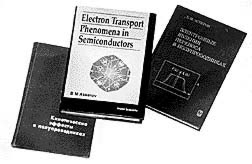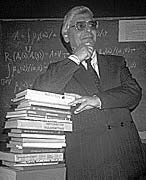|

Summer 1996 (4.2)
Page 34
Scientists Who
Made A Difference
Bahram Askarov
- Semiconductors
Lotfi Zadeh - "Creator of Fuzzy Logic"
Rafig Aliyev - Fuzzy Systems
Bahram Askarov
by Marcus Hopkins
  "Being a physicist," according
to Dr.
Bahram Askarov, "is a lot like being a poet. You
have to feel it. You always have to keep asking yourself 'Why?'
Substances and processes are not always obvious. Like the intangibles
of poetry, you have to imagine them." "Being a physicist," according
to Dr.
Bahram Askarov, "is a lot like being a poet. You
have to feel it. You always have to keep asking yourself 'Why?'
Substances and processes are not always obvious. Like the intangibles
of poetry, you have to imagine them."
Askarov credits his high school teacher in a little village near
the town of Taus, in the northwestern corner of Azerbaijan with
giving him the curiosity to feel and imagine these intangibles.
He was Askarov's teacher in math and physics and very much wanted
the young lad to become a physicist.
Askarov, who is now the Vice Chancellor of Baku State University
and Head of the Solid State Physics Department, has been deeply
involved with the field of semiconductors since college.
Semiconductors are devices inside
electrical devices that are in use all the time-televisions,
remote controls, tape recorders-it's just that most of us don't
know we're using them."
  The
field of semiconductors began in the 1930s and 40s. Although
people had known for quite some time about substances that had
the capabilities to conduct electricity; semiconductors had always
been considered "bad insulators" and had been ignored.
In winter semiconductors could be used as insulators but in the
summer, they changed character, and conducted electricity. The
field of semiconductors began in the 1930s and 40s. Although
people had known for quite some time about substances that had
the capabilities to conduct electricity; semiconductors had always
been considered "bad insulators" and had been ignored.
In winter semiconductors could be used as insulators but in the
summer, they changed character, and conducted electricity.
Lotfi
Zadeh - Creator of Fuzzy
Logic. Berkeley, California.
Abram Ioffe was considered the "Father of the Concept of
Semiconductors" in the former Soviet Union. He had studied
in Germany with Röntgen (Winner of the Nobel Prize in physics
in 1901 for the discovery of X-rays). Askarov ended up being
one of privileged twelve students from the entire Soviet Union
who was chosen to study to do postgraduate work with Ioffe at
the Ioffe Institute in Leningrad. Askarov, 22 at the time, went
to Leningrad and worked with Ioffe for four and a half years.
After the field of nuclear physics, semiconductors was considered
the most advanced field of physics in the former USSR.
Three Books on
Semiconductors
Askarov's book, "The
Theory of Semiconductors" came out in 1963 (Elm). In 1970,
a second edition came out, "The Kinectic Effects in Semiconductors"
which systematized all the ideas known in the world at that time
about semiconductors (about 30 percent of the book). The other
70 percent is his original research. The book was so successful
that Askarov did not have to defend his dissertation for his
Postdoctorate; the degree was given for the book alone, which
was an extremely unique situation. In 1974, when Askarov was
34, he received the State Prize of Azerbaijan for this work.
In 1985, the book was reissued with new findings and new ideas
(Moscow, 1985). An English translation of the book came out in
1994-"Electron Transport Phenomenon in Semiconductors"
(World Science Publishing House-Singapore).
The Future
What about the future?
Askarov and his students are continuing to carry out research
in the direction of micro-miniaturization which means they're
trying to achieve reduction of the size of devices, making them
as small as possible. According to Askarov, the achievements
that the Japanese and Americans are making in this field, are
actually based on theoretical studies that were made in the Soviet
Union. "We discovered many of the fundamental theories;
now others are putting them to practical use."
  Left: Rafig Aliyev
Expert in Fuzzy systems. Oil Academy, Baku. Left: Rafig Aliyev
Expert in Fuzzy systems. Oil Academy, Baku.
Dr. Lotfi Zadeh developed
the concept for "Fuzzy Logic" in 1965. Today, it has
myriad uses especially in control systems when it is necessary
to deal with information that is inexact and imprecise.
"Fuzzy Logic" has hundreds and thousands of applications
and is currently used in air conditioners, car brakes, dishwashers,
dryers, elevators, microwaves, computers, and television and
much more.
Zadeh was born in Baku in 1921. Though he officially retired
from the University of Berkeley in 1991, he's extremely active
these days participating in "Fuzzy Logic" and related
conferences all over the world.
See our interview
with Zadeh in the Autumn 1994 issue (AI 2.4) page 46,
which is also available on Azerbaijan International's Web Page:
(http://www.azer.com).
Dr. Rafig Aliyev is the leading scientist in Fuzzy Process Control
and Soft Computing in Azerbaijan. Professor, Corresponding Member
of the Academy of Sciences, and USSR State Prize Winner, Aliyev
heads the Department of Control Systems of Azerbaijan's State
Oil Academy. He has published extensively-28 books (see photo)
and more than 200 articles-mostly in the fields of information
and management systems.
Again, this year, Aliyev is
the Co-Chair for the Second International Conference on the Application
of Fuzzy Systems and Soft Computing which will be held in Siegen,
Germany, on June 25-27, 1996. Lotfi Zadeh is the Honorary Chairman.
From Azerbaijan International (4.2) Summer 1996
© Azerbaijan International 1996. All Rights Reserved.
Back to Index
AI 4.2 (Summer 1996)
AI Home
| Magazine
Choice
| Topics
| Store
| Contact
us
|



